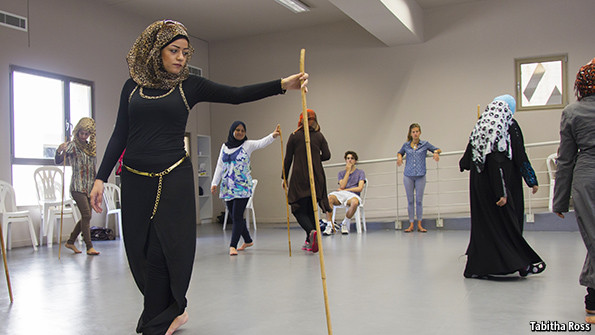THE ECONOMIST

I haven’t smiled in two years—this is the first time,” beams a middle-aged refugee. Thirty Syrian women are standing in a large room in St Joseph University in Beirut as an energetic British/Iraqi actress directs their movements. They are rehearsing “Antigone of Syria”, an adaptation of a tragedy by Sophocles, in a workshop run by a British/Syrian production company—and none of them have acted before.
The tale of Antigone’s defiance against state repression retains a similar political relevance today to when it was written down 2,500 years ago. While the workshop is as much about empowering female refugees as it is about the production, the choice of play in the context of the Syrian conflict is striking. A tragedy of familial love, female courage, resistance against the state and blurred moral lines, it acts as a reminder that the role of the state, and of women within the state, is in momentous flux in Syria.
The tragedy tells of Antigone’s defiance of her uncle, Creon, in performing funeral rites for her brother Polynices. Polynices had attacked the city of Thebes in order to take the crown from his brother, in accordance with their agreed rotation of power. But both brothers die in battle, leaving Creon as king. According to the law of the polis (state) ordained by Creon, Polynices must be left unburied outside the city walls as a traitor, carrion for the dogs and birds. Antigone breaks the law, though, because she considers the unwritten law of the oikos (home)—that you should bury a relative’s body with the proper rites—more important. She faces being buried alive for ignoring Creon’s ruling.
Questions at the heart of “Antigone”—can kinship exist without the support and mediation of the state, and can a state exist without the family as its support—may equally be asked of Syria. Hafez Assad, father of Bashar Assad and totem of a secular Syria until his death in 2000, tried to cultivate a sense of nationalism among his subjects by emphasising the family unit. Early pictures of his mother and sons form part of the cult of Assad and helped place the family at the centre of the state.
The Economist for more
(Thanks to reader)
